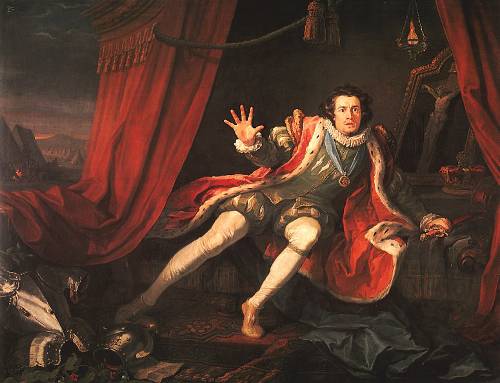
David Garrick revolutionized the 18th-century stage with a naturalistic style of acting that replaced the self-conscious theatricality of the earlier tradition. Audiences flocked to see his productions, forsaking earlier favorites such as James Quin, who admitted, “If this young fellow be right, then we have been all wrong.”
Garrick died in 1779, so we have no recordings of his performances. But we do have this:

That’s Garrick’s line reading preserved in the “prosodia rationalis,” a system for recording linguistic prosody using a music-like notation. Its creator, Joshua Steele, had attended a Garrick performance in order to compare his own rendering of Hamlet with that of the acclaimed actor. He found that “that speech, or soliloque, which I (for want of better judgement) have noted in the stile of a ranting actor, swelled with forte and softened with piano, he delivered with little or no distinction of piano and forte, but nearly uniform; something below the ordinary force, or, as a musician would say, sotto voce, or sempre poco piano.”
Steele gives a few other fragments of Garrick’s performance, but “I shall forbear to give any more specimens of that great actor’s elocution, from the memory of once hearing, lest I should do him injustice, as my intention here is not to play the critic; but merely to shew, that by means of these characters, all the varieties of enunciation may be committed to paper, and read off as easily as the air of a song tune.”
Related (sort of): The Parrot of Atures.
